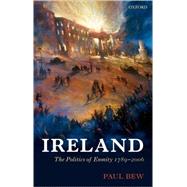Ireland The Politics of Enmity 1789-2006
, by Bew, Paul- ISBN: 9780199561261 | 0199561265
- Cover: Paperback
- Copyright: 5/1/2009
The French revolution had an electrifying impact on Irish society. The 1790s saw the birth of modern Irish republicanism and Orangeism, whose antagonism remains a defining feature of Irish political life. The 1790s also saw the birth of a new approach to Ireland within important elements of the British political elite, men like Pitt and Castlereagh. Strongly influenced by Edmund Burke, they argued that Britain's strategic interests were best served by a policy of catholic emancipation and political integration in Ireland. Britain's failure to achieve this objective, dramatized by the horrifying tragedy of the Irish famine of 1846-50, in which a million Irish died, set the context for the emergence of a popular mass nationalism, expressed in the Fenian, Parnell, and Sinn Fein movements, which eventually expelled Britain from the greater part of the island. This book reassesses all the key leaders of Irish nationalism-Tone, O'Connell, Butt, Parnell, Collins, and de Valera - alongside key British political leaders such as Peel and Gladstone in the nineteenth century, or Winston Churchill and Tony Blair in the twentieth century. A study of the changing ideological passions of the modern Irish question, this analysis is, however, firmly placed in the context of changing social and economic realities. Using a vast range of original sources, Paul Bew holds together the worlds of political class in London, Dublin, and Belfast in one coherent analysis which takes the reader all the way from the society of the United Irishman to the crisis of the Good Friday Agreement.







